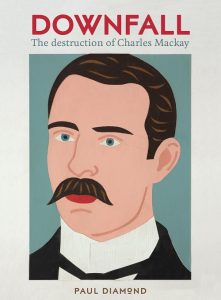Downfall: The destruction of Charles Mackay
PAUL DIAMOND
In May 1920, a shocking scandal rocked genteel Whanganui: the town’s flamboyant mayor, Charles Mackay, had been arrested for shooting the young gay poet D’Arcy Cresswell, who he believed was blackmailing him. The local population was enthralled by the history-making trial during which Mackay’s homosexuality was revealed and a sentence of hard labour handed down. Bizarrely, the ‘crime’ of being homosexual was even more scandalous than attempted murder, and Mackay’s name was thereafter expunged from Whanganui’s history.
Now a new book, Downfall: The destruction of Charles Mackay, the outcome of years of digging by historian Paul Diamond and published by Massey University Press in November, shines a light on the vengeful impulses behind the blackmail and Mackay’s ruination.
‘I wonder if there would be anything these days which was so bad that we’d try to eliminate all traces of a person from the record,’ says Paul Diamond. ‘As part of my research, I discovered references suggesting that others may have been involved in
the 1920 scandal and that Mackay took the blame. This could help explain why the town reacted the way it did.’
The cast of this tale includes the Prince of Wales, the president of the RSA, Sir Robert Stout, Blanche Baughan . . . even Lady Ottoline Morrell. But it is much more than an extraordinary story of scandal: at its heart, the Mackay affair reveals the perilous existence of homosexual men and how society conspired to control and punish them.
Mackay had married into Whanganui high society, and the story of his spectacular fall from grace has long been the town’s dark secret. After serving time, Mackay left New Zealand for London, before moving to the liberal heart of Berlin — only to be shot by a police sniper on the streets of Berlin during civic unrest as the Nazis came to power.
This important new history is a careful examination of an important and little understood moment in our past and is unique for the queer lens through which it views the complex lives and motivations of key figures in late-Edwardian New Zealand, and the systems within which they operated. Only now is Mackay’s legacy — Whanganui’s arts and civic amenities — being remembered.
ABOUT THE AUTHOR
Paul Diamond (Ngāti Hauā, Te Rarawa, Ngāpuhi) is Curator, Māori at the Alexander Turnbull Library. He is the author of A Fire in Your Belly: Māori leaders speak (Huia, 2003), Makereti: Taking Māori to the world (Random House, 2007) and Savaged to Suit: Māori and cartooning in New Zealand (Fraser Books, 2018). He has previously worked as an oral historian and broadcaster, and in 2017 he was awarded Creative New Zealand’s Berlin Writer’s Residency.

